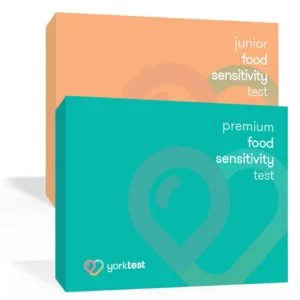- Types of IgE Blood Tests: Total IgE and Allergen-Specific IgE Test
- Total IgE Test
- Allergen-Specific IgE Test
- What are Common Allergens Tested in an IgE Blood Test?
- What are Normal IgE Levels by Age?
- How is an IgE Blood Test Performed?
- How Long Does it Take to Get the Results of an IgE Blood Test?
- How Accurate are Allergen-specific IgE Tests in Diagnosing Allergies?
What is an IgE Blood Test?
An IgE blood test is a particular type of blood test that measures the levels of immunoglobulin E (IgE) antibodies in a person’s blood. IgE is a specific type of antibody that the immune system produces in response to allergens or other perceived threats that enter the body. This IgE antibody release triggers an allergic reaction and a host of unpleasant symptoms.
IgE blood testing is designed to help detect allergies to certain foods, pets, pollens, or other irritating substances.[1] The test can also be used to help determine if a child has an allergy, immune system deficiency, or infection involving a parasite. In general, higher amounts of IgE can indicate that the body overreacts to allergens, thereby leading to an allergic reaction. An IgE blood test seeks to determine exactly how high an individual’s IgE levels are in regard to certain allergens.
Types of IgE Blood Tests: Total IgE and Allergen-Specific IgE Test
An IgE blood test comes in two primary forms–a total IgE test and a specific IgE test–each designed to take different measurements. The main difference between a total IgE test and an allergen-specific IgE test is what they measure. While a total IgE test measures the total amount of IgE antibodies in the blood, an allergen-specific IgE test measures how much IgE the body makes in response to a single allergen. Here are more key distinctions between these two tests:
Total IgE Test
The total IgE test is used to measure the sum total of all types of IgE antibodies in the blood. It’s primarily used for the diagnosis and treatment of immune disorders, parasitic infections, allergic reactions, and asthma. At a glance, the total IgE test:
- Takes a complete measurement of the total amount of IgE antibodies in the blood.
- Used to diagnose certain conditions and plan treatment for people with asthma tied to allergies.
- Does not pinpoint specific allergies or conclusively identify if an individual has allergies.
- Not commonly used in allergy testing.
Allergen-Specific IgE Test
An allergen-specific IgE test is used for specific allergy diagnosis, treatment planning, anaphylaxis risk assessment, and evaluation for respiratory allergies. It helps in identifying specific allergens causing allergic reactions and is an important tool in developing personalized treatment plans for individuals with allergies.
More specifically, an allergen-specific IgE test:
- Measures how much IgE antibody the body produces in response to a single allergen
- A separate blood sample is tested for each individual allergen that may be causing symptoms
- Can identify the allergen or substance that the body is reacting to
- Used to look for some kinds of allergies, including types of food, pet dander, pollen, mold, medicine, dust mites, latex, or insect venom.
Because each test measures different things, these two blood tests have different purposes. An allergen-specific IgE test can offer more detailed information about particular immune responses, while a total IgE test may provide more information when diagnosing certain conditions and planning treatment for people with asthma tied to allergies
What are Common Allergens Tested in an IgE Blood Test?
An IgE blood test can be used to identify a wide range of allergies, including types of food, animal dander, pollen, mold, medicine, dust mites, or latex. In fact, a specific IgE test can assess over 500 whole allergens with a single blood sample. The test can identify relevant allergens that contribute to symptoms, helping healthcare providers prescribe appropriate medication and create an individually tailored plan for managing allergy symptoms. The result of a specific IgE test is then reported for a grouped allergen mix or an individual allergen.
The following are some of the common allergens tested in an IgE blood test:
- Foods like cow’s milk, eggs, fish, nuts, soy, and other fruits and vegetables
- Inhalants like dust mites, pollen, and mold
- Animal dander, such as dog or cat hair
- Medications like penicillin
- Latex
- Insect venom, such as bee or wasp stings
Not all IgE blood tests are the same, as certain tests are designed to look for specific allergens. In turn, it’s important to note that the specific allergens tested may vary depending on the laboratory or any particular preferences of the healthcare provider.
What are Normal IgE Levels by Age?
Because IgE levels can vary at different stages of life, reference values of normal IgE levels are categorized by age range. According to the pathology lab at the University of Florida, the general range for normal IgE levels is as follows:
- <1 year: 0 – 15 IU/mL
- 1 to 5 years: 0 – 60 IU/mL
- 6 to 9 years: 0 – 90 IU/mL
- 10 to 15 years: 0 – 200 IU/mL
- Adults: 0 – 100 IU/mL
IU/mL, or International Units Per Milliliter (IU/mL), is the standardized measurement of IgE antibodies, providing a globally understood metric.
For healthy adults, the normal range varies from 1.5 to 100 UI/mL, with a normal upper limit extending to upwards of 300 UI/mL. IgE levels that go above 300 UI/mL in adults are generally considered to be high.
While these metrics are helpful benchmarks, most IgE blood tests show results in an easy-to-understand format. For example, YorkTest’s Home-to-Laboratory test kits include a simple guide to help understand the individual’s food allergies or sensitivities.
The test results are presented in a traffic light-style format indicating the level of an allergy, with red indicating high IgE levels and a possible allergic response, while green indicates normal IgE levels and would suggest no allergic response.
How is an IgE Blood Test Performed?
The process in which IgE blood tests are administered depends on the type of test and the setting the test is carried out. The two main forms are laboratory tests which are either carried out in a clinical setting or at-home sampling tests which are then mailed to an accredited lab for testing.
In a clinical setting, the steps in performing an IgE blood test involve the following steps:
- A healthcare provider will clean the area where the blood will be drawn, usually the inside of the elbow or the back of the hand.
- They will then wrap an elastic band around the upper arm to make the veins more visible and easier to access.
- Using a sterile needle, they will draw a small amount of blood from a vein in the arm.
- The blood sample will be sent to a laboratory for analysis.
In the laboratory, the blood sample will be tested for the levels of IgE antibodies. The results of the test will be reported for a grouped allergen mix or an individual allergen. Keep in mind that the specific allergens tested vary depending on the lab and the healthcare provider’s preference
At-home IgE blood tests provide added convenience to better understand potential allergy conditions. Like clinical settings, the testing company looks for specific indicators in the blood. Based on their findings, they send you a list of foods or allergens that may have triggered your symptoms.
To collect a blood sample for an at-home IgE test, you may need to do the following:
- Order a kit from the testing company that includes all the tools and directions necessary to take a sample.
- Use a lancet to prick your finger and collect a small amount of blood.
- Squeeze a few drops of blood onto the collection card provided in the kit.
- Mail the sample back to the testing company in a prepaid envelope.
- Wait for the results, which are usually available within a few business days.
Each approach has its advantages and disadvantages, but both are considered reliable, safe, and accurate in determining specific allergies.
How Long Does it Take to Get the Results of an IgE Blood Test?
The time it takes to get the results of an IgE blood test can vary depending on the type of test and the laboratory that performs it. The results from a total IgE test are usually available within a few business days after the laboratory receives and tests your blood sample.
Allergen-specific IgE tests may take a bit longer as it takes several days for the blood sample to be sent to a laboratory plus the time needed to evaluate the sample. The exact time frame can vary based on the testing company and the specific allergens being tested. But in most cases, it takes about a week to receive results after a blood sample has been taken and sent in for testing.
How Accurate are Allergen-specific IgE Tests in Diagnosing Allergies?
Allergen-specific IgE tests are a useful tool in identifying possible allergies, but they are not always 100% accurate.[2] The sensitivity of specific IgE tests ranges from 60% to 99%, and the specificity ranges from 30% to 99%, depending on the type of allergen and the age of the patient.
YorkTest’s Food Allergy Test kit offers a comprehensive and affordably priced option that covers 23 different foods and 18 other common allergens. This is just one of many different at-home food allergy and sensitivity test kits available through YorkTest, all involving an accurate, expert analysis from its accredited laboratory.
Scientific References:
- Siles RI, Hsieh FH. Allergy blood testing: A practical guide for clinicians. Cleve Clin J Med. 2011 Sep;78(9):585-92. doi: 10.3949/ccjm.78a.11023. PMID: 21885690.
- Ansotegui IJ, Melioli G, Canonica GW, Caraballo L, Villa E, Ebisawa M, Passalacqua G, Savi E, Ebo D, Gómez RM, Luengo Sánchez O, Oppenheimer JJ, Jensen-Jarolim E, Fischer DA, Haahtela T, Antila M, Bousquet JJ, Cardona V, Chiang WC, Demoly PM, DuBuske LM, Ferrer Puga M, Gerth van Wijk R, González DÃaz SN, Gonzalez-Estrada A, Jares E, KalpaklioÄŸlu AF, Kase Tanno L, Kowalski ML, Ledford DK, Monge Ortega OP, Morais Almeida M, Pfaar O, Poulsen LK, Pawankar R, Renz HE, Romano AG, Rosário Filho NA, Rosenwasser L, Sánchez Borges MA, Scala E, Senna GE, Sisul JC, Tang MLK, Thong BY, Valenta R, Wood RA, Zuberbier T. IgE allergy diagnostics and other relevant tests in allergy, a World Allergy Organization position paper. World Allergy Organ J. 2020 Feb 25;13(2):100080. doi: 10.1016/j.waojou.2019.100080. Erratum in: World Allergy Organ J. 2021 Jun 17;14(7):100557. PMID: 32128023; PMCID: PMC7044795.











